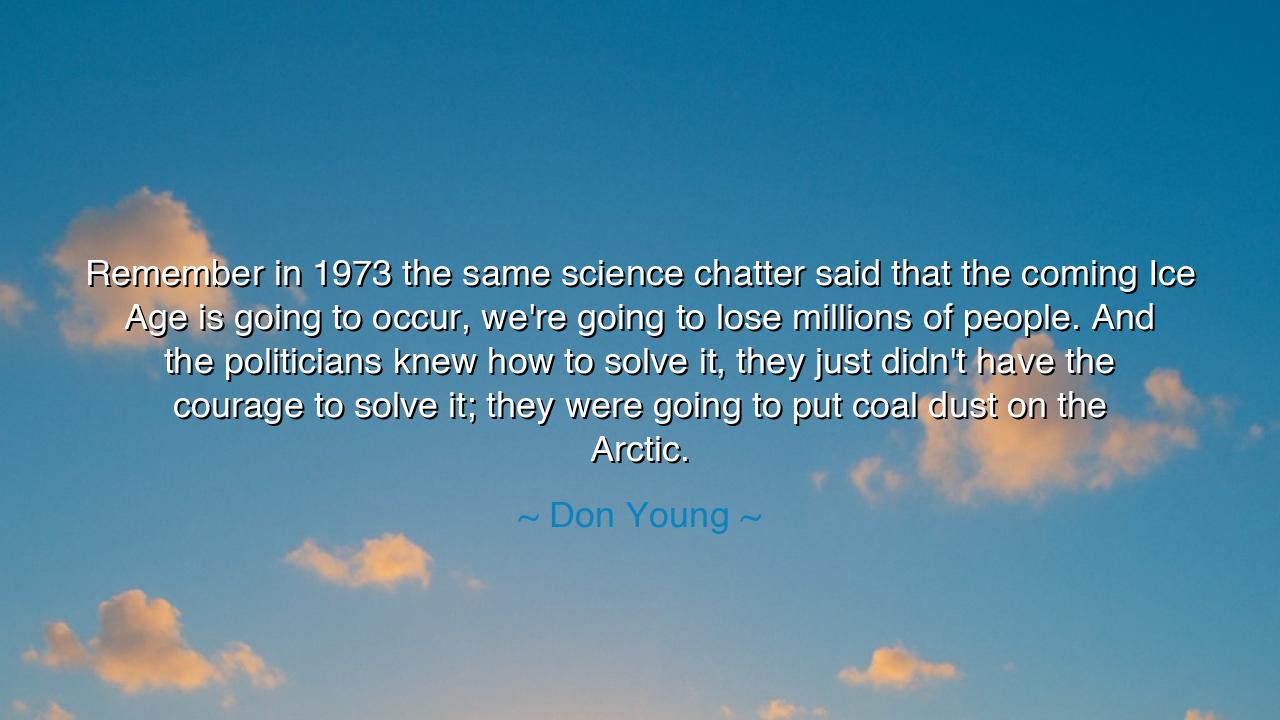
Remember in 1973 the same science chatter said that the coming
Remember in 1973 the same science chatter said that the coming Ice Age is going to occur, we're going to lose millions of people. And the politicians knew how to solve it, they just didn't have the courage to solve it; they were going to put coal dust on the Arctic.






The statesman Don Young, with the candor of one who had seen many seasons of mankind’s folly, once said: “Remember in 1973 the same science chatter said that the coming Ice Age is going to occur, we’re going to lose millions of people. And the politicians knew how to solve it, they just didn’t have the courage to solve it; they were going to put coal dust on the Arctic.” In these words, beneath their plain and rugged form, lies a warning as ancient as time: beware the arrogance of fear and the cowardice of inaction. Young speaks of an era not far removed, when the voices of authority trembled with predictions of doom — and yet, the same hearts that sounded the alarm lacked the courage to act with reason and restraint.
The origin of this reflection comes from a moment in the early 1970s, when whispers of a new Ice Age spread across scientific and political circles. Reports, misinterpreted and magnified by the media, painted visions of frozen cities and global famine. It was a time when humanity’s understanding of the planet’s climate was still in its infancy, and fear became a loud companion to ignorance. Some, in their desperation to conquer nature, proposed scattering coal dust over the Arctic, to absorb the sun’s warmth and stave off the imagined freeze. Thus, even as mankind gazed into the heavens and mapped the stars, it showed how little it still understood the delicate harmony of the earth.
Don Young, a man of blunt wisdom, saw in that history a lesson about the perils of panic without prudence. For it is not science itself he condemns, but the chatter that surrounds it — the noise that turns discovery into doctrine, and curiosity into fear. Science, when joined with humility, is the torch of progress; but when joined with pride, it becomes a mirror that blinds rather than illuminates. In 1973, humanity stood not before an Ice Age, but before a test of reason and courage — and it faltered. The politicians, though armed with theories and advisors, lacked the fortitude to question their own understanding, to act not from fear, but from balance.
History, as it often does, repeated this pattern. In every generation, there come prophets of doom who cry that the end is near, and leaders without courage who seek easy answers rather than enduring wisdom. In the ancient days, the city of Athens fell into ruin not from lack of knowledge, but from the pride of those who believed they could control every fate through cleverness. In Rome, too, scholars once claimed they could command the weather through sacrifices and auguries, yet the empire collapsed under the weight of its own arrogance. Don Young’s quote reminds us that the truest danger is not the wrath of nature, but the folly of those who think they can rule it without understanding it.
And yet, his words are not merely a rebuke — they are a call to courage. The courage to listen, but also to question; to respect science, but not to worship it; to trust in human ingenuity, but not to mistake it for omnipotence. In every age, the world will present new fears — ice, fire, famine, flood — and in each age, the soul of humanity will be tested not by the threats themselves, but by how we respond to them. Shall we act with panic or with patience? Shall we follow the loudest voice or the wisest? The courage that Young speaks of is not the courage to act rashly, but the courage to stand in truth amidst confusion.
In this way, his statement mirrors the timeless wisdom of the ancients. The philosopher Marcus Aurelius once wrote: “If you are troubled by external things, it is not they that disturb you, but your judgment of them.” So too with the fears of 1973 and beyond — it is not the threats that undo us, but our own fear of them. When leaders act from dread, they scatter dust upon the world — whether coal dust or confusion — believing they can fix the sky, when they have not yet understood the ground beneath their feet.
Let this teaching be passed to future generations: truth requires courage, and courage requires humility. Do not be swayed by the noise of the age, nor by those who profit from fear. Seek knowledge with reverence, but temper it with wisdom. Let your heart be steady in the face of uncertainty, and your actions guided not by alarm, but by understanding. For the Earth, though vast and changing, responds not to panic, but to patience.
And so, as Don Young warned, remember the lessons of the past: that knowledge without courage leads to folly, and fear without faith leads to ruin. The wise do not scatter dust upon the Arctic to chase away shadows of their imagination. Instead, they learn to walk gently upon the earth, to think deeply, to act bravely, and to trust that truth — like the sun — will reveal itself in time to those who dare to see it clearly.






AAdministratorAdministrator
Welcome, honored guests. Please leave a comment, we will respond soon